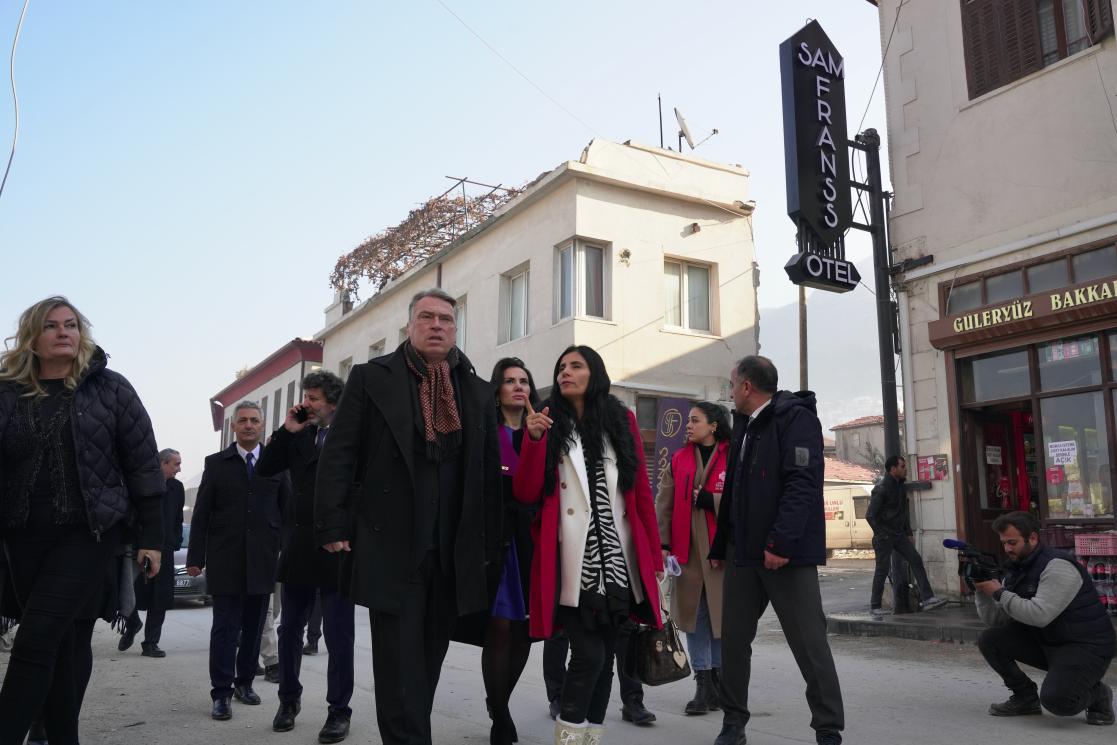Two Years On: How the EU Continues to Support Türkiye After the 2023 Earthquakes

Children go to schools that have been built in temporary accomadition centers.
It is hard for her to tell the story of how she lost her husband, who went downstairs to save his brother and his family as their building was shaken by one of the strongest earthquakes in Türkiye’s history.
She is left with five children. She says life is not easy without her husband but her voice fills with pride when she says her three daughters study at the university. “I'm sure if he could see our daughters, he would have been very proud too.”
She lives in Büyükdalyan container city in Hatay with her remaining family and thousands of other earthquake survivors. The container city has become home to almost 4,000 people who support each other every step of the way during these challenging times.
Two years on, Hatay is still grappling with the aftermath of the devastating earthquakes. The local population is resilient, drawing strength from their history, which tells of the city being completely destroyed seven times because of earthquakes. Now, they are determined to rebuild their city for the eighth time, and the European Union (EU) continues to support them.
Marking the second anniversary of the earthquakes, EU Commissioner for Equality, Preparedness and Crisis Management Hadja Lahbib visited the affected region on 20 February. Earlier, in December, Ambassador Thomas Ossowski, Head of the EU Delegation to Türkiye, visited Hatay. These visits underscore the union's dedication to supporting Türkiye almost two years after the catastrophic earthquakes of February 2023.

EUROPEAN UNION, 2025
EU Commissioner for Equality, Preparedness and Crisis Management Hadja Lahbib visited Gaziantep, Nurdağı on the second anniversary of the devastating earthquakes.
A key component of the EU's support is temporary housing for people displaced by the earthquakes. The Büyükdalyan container village where Zeynep and her family live, for instance, is not just a shelter; it is equipped with healthcare facilities to ensure that residents have access to essential medical services and schools for children.
In another temporary village, Üzümdali in Hatay, the health unit is staffed by general practitioners, midwives/nurses, psychologists, a social worker, technicians, and auxiliary staff.
Restoring History
The EU Solidarity Fund is financing the restoration of Hatay’s historic city area and cultural heritage sites. Ambassador Ossowski's visit to the restoration works highlighted the importance of preserving the city's rich history while rebuilding for the future. This effort not only restores physical structures but also revitalizes the cultural and historical fabric of the community.

EUROPEAN UNION, 2025
The EU Solidarity Fund is financing the restoration of Hatay’s historic city area, including the first ever illuminated street in the history, Kurtuluş Street.
Kurtuluş Street, the first-ever illuminated street in history, is being restored with the support of the EU. The city has been home to multicultural layers of history, and now hopes to have the lights on again, with historical buildings continuing to stand as witnesses to its rich cultural background.
Building Resilient Communities for Crises
The EU is supporting civil society in Hatay. This involves training and equipping local organizations to respond effectively to future emergencies, building a resilient community prepared to face any challenges that may arise. Local organizations are often the first responders and need the skills and resources to help others in emergencies.
While in Hatay, the Ambassador joined the opening ceremony of the Civil Society Development Centre, wishing that the new office will contribute to a more effective, coordinated, and principled response by civil society organizations to potential future disasters.
A specific project, “Supporting the Capacity of Civil Society Organizations (CSOs) in Disaster Risk Management,” has been launched to ensure that civil society organizations adopt international standards in combating natural and human-made disasters and incorporate disaster risk management into their corporate policies.

EUROPEAN UNION, 2025
Supporting the Capacity of Civil Society Organizations in Disaster Risk Management project launched in Hatay.
Canan Aygün, the field officer of the centre, emphasized that this office is the first and only one outside Ankara, Türkiye’s capital, highlighting its potential to bring together all CSOs in the region and to serve as a meeting point for international CSOs.
“Since the day our office was established, it has been actively used by civil society organizations in Hatay, and we have hosted 25 events. We are very pleased with this because this is exactly the purpose for which our office was founded,” she says.
As Türkiye continues its journey towards recovery, the ongoing support from the European Union remains a beacon of hope. The collaborative efforts to rebuild the cities are a testament to the resilience of the people of Türkiye and the strength of international solidarity.
BACKGROUND:
Two years ago, on 20 March, a total of €7 billion was pledged by the international community at the International Donors' Conference ‘Together for the people in Türkiye and Syria', co-hosted on 20 March by the President of the European Commission, Ursula von der Leyen, and by the Prime Minister of Sweden, Ulf Kristersson, for the Swedish Presidency of the Council.
Another significant milestone in the EU's support was the signing of a €400 million agreement with Türkiye on February 7, 2024. This substantial financial aid package is earmarked for several critical sectors, reflecting the multifaceted approach needed for effective recovery, including temporary accommodation, education, the health sector, and cultural heritage. These funds are pivotal in addressing both immediate needs and long-term reconstruction goals.





